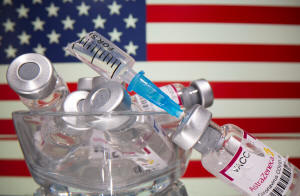AstraZeneca, U.S. agree 500,000 more supplies of COVID-19 antibody
cocktail
 Send a link to a friend
Send a link to a friend
 [March 16, 2021]
By Pushkala Aripaka [March 16, 2021]
By Pushkala Aripaka
(Reuters) - AstraZeneca will supply up to
half a million extra doses of its experimental antibody-based COVID-19
combination therapy to the United States, in a bright spot for the
company after more governments suspended use of its vaccine over safety
fears.
The antibody therapy, which has yet to be approved by U.S. regulators,
is designed to treat the disease rather than prevent it like the
vaccine, which several countries have stopped using while reports of
blood clots in some people are investigated.
The Anglo-Swedish drugmaker said on Tuesday the $205 million U.S.
extension for 500,000 antibody doses builds on a contract agreed with
government agencies in October for initial supplies of 200,000 doses of
the antibody cocktail, AZD7442.

The treatment is a combination of two monoclonal antibodies,
London-listed AstraZeneca said, adding that the new agreement is
contingent on an emergency use approval by the U.S. Food and Drug
Administration.
"The US Government's support is critical in helping accelerate the
development of AZD7442," AstraZeneca Chief Executive Pascal Soriot said.
The total value of the deal now stands at $726 million for up to 700,000
doses. AZD7442 is being evaluated in late-stage trials, the company
said, adding that it currently does not expect any changes to its 2021
forecasts due to the deal.
[to top of second column]
|

Vials labelled with broken sticker "AstraZeneca COVID-19 Coronavirus
Vaccine" and a broken syringe are seen in front of a displayed U.S.
flag in this illustration taken March 15, 2021. REUTERS/Dado Ruvic/Illustration

While AstraZeneca has undergone a rollercoaster ride with its
COVID-19 vaccine, it has been working on developing new treatments
and repurposing its existing drugs to prevent and treat coronavirus
infections.
Monoclonal antibodies, such as the ones being used in AZD7442, are
synthetically manufactured copies of the human body's natural
infection-fighting proteins, and are already being used to treat
some types of cancers.
A series of issues have bogged down the drugmaker's vaccine rollout:
including pauses in trials, questions over the most effective
dosing, and supply problems. Share gains from optimism around the
cheap and easy-to-ship shot have also been decimated.
On Tuesday, the stock was up 1.5% at 7,090 pence in early trading.
At its peak in July last year, the company hit 10,120 pence.
(Reporting by Pushkala Aripaka in Bengaluru, Editing by Sherry
Jacob-Phillips and Philippa Fletcher)
[© 2021 Thomson Reuters. All rights
reserved.] Copyright 2021 Reuters. All rights reserved. This material may not be published,
broadcast, rewritten or redistributed.
Thompson Reuters is solely responsible for this content. |